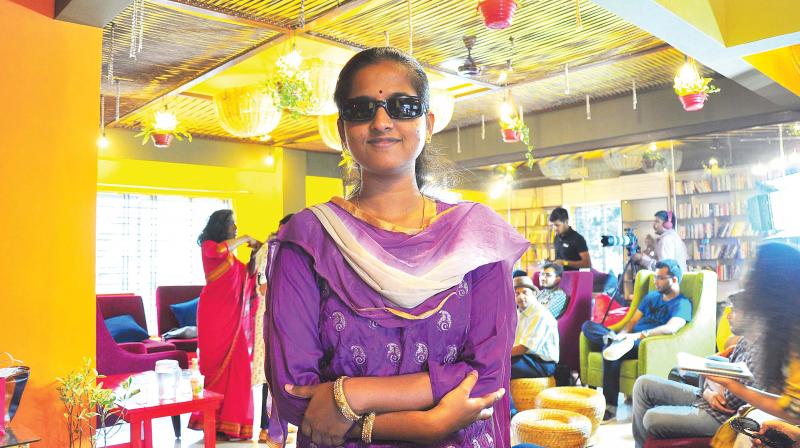She talks about challenges she faces in running the institution and her expectations from the government.
In 2014, she established Belaku Academy for visually challenged children.
Being visually challenged could be the biggest hurdle in fighting challenges in life. But Ashwini Angadi has faced these challenges and has also set out on a mission to educate the children who are visually challenged. Aksheev Thakur talks to Ms Angadi, winner of Limca Book of Records 2016 and winner of Queen’s Young Leader Award in London which was bestowed upon by Queen Elizabeth II in 2015. In 2014, she established Belaku Academy for visually challenged children. She talks about challenges she faces in running the institution and her expectations from the government.
What made you set up a school for visually impaired students?
After taking part in a global event, Young Voices, in 2011 and 2012 as a National Facilitator, I received an award from the United Nations. During the course of the event, I came across several young, visually impaired children and it motivated me to set up the Belaku Academy in 2014. Apart from free accommodation, we provide free quality education to young children. I can proudly say that I am a mother to 35 children, who are studying at our school.
How do you find such children? What are the challenges you face in getting them to your institution?
I collect the data from Anganwadi and taluk officers and later, I approach their families. The biggest challenge I face is resistance from their families. To convince the parents, I bring them to the city with their children. During vacations, I drop them to their hometowns and bring them again after the vacations.
How do you collect funds for the institution?
It comes from the public who know me and my work. I usually give motivational speeches at schools and colleges and those among the audience volunteer to give us funds. Though we need more to run the institution, we are managing. We do expect some help from the government too.
What do you expect from the government?
We are staying in leased buildings. I want the children at my institution to study after class 7 too, for which we need more buildings. I want the government to say that we are allowed to run institution even after class 7. Also, government officials are making me run to their offices once every three months and that should stop.
How do you select teachers for your school? Are they patient enough with the children?
I interview the teachers and pay them for their work. We also get volunteers who come to the institution and educate the children. I select only those teachers who are passionate about teaching visually impaired children. If you are passionate about it, you will definitely be patient.
You said that people are sympathetic towards visually impaired children but not empathetic. What does it mean?
There is a quota in jobs, which is necessary. But at panchayats etc, the visually impaired are just given money, which we do not want. Unlike the government, the corporate sector, if they find talent among the disabled, offer work and pay accordingly. We are people with self-respect and do not want a single paisa without work. The government should take the help of training centres for the visually impaired and employ them. Only then inclusiveness will increase.
Article Source: Deccan Chronicle

